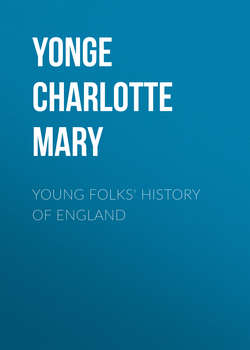Читать книгу Young Folks' History of England - Yonge Charlotte Mary - Страница 6
CHAPTER VI
THE NORMAN CONQUEST
A.D. 1035—1066
ОглавлениеCnut left three sons; but one was content to be only King of Denmark, and the other two died very soon. So a great English nobleman, called Earl Godwin, set up as king, Edward, one of those sons of Ethelred the Unready who had been sent away to Normandy. He was a very kind, good, pious man, who loved to do good. He began the building of our grand church at Westminster Abbey, and he was so holy that he was called the Confessor, which is a word for good men not great enough to be called saints. He was too good-natured, as you will say when you hear that one day, when he was in bed, he saw a thief come cautiously into his room, open the chest where his treasure was, and take out the money-bags. Instead of calling anyone, or seizing the man, the king only said, sleepily, "Take care, you rogue, or my chancellor will catch you and give you a good whipping."
You can fancy that nobody much minded such a king as this, and so there were many disturbances in his time. Some of them rose out of the king—who had been brought up in Normandy—liking the Normans better than the English. They really were much cleverer and more sensible, for they had learnt a great deal in France, while the English had forgotten much of what Alfred and his sons had taught them, and all through the long, sad reign of Ethelred had been getting more dull, and clumsy and rude. Moreover, they had learnt of the Danes to be sad drunkards; but both they and the Danes thought the Norman French fine gentlemen, and could not bear the sight of them.
Think, then, how angry they all were when it began to be said that King Edward wanted to leave his kingdom of England to his mother's Norman nephew, Duke William, because all his own near relations were still little boys, not likely to be grown up by the time the old king died. Many of the English wished for Harold, the son of Earl Godwin, a brave, spirited man; but Edward sent him to Normandy, and there Duke William made him swear an oath not to do anything to hinder the kingdom from being given to Duke William.
Old King Edward died soon after, and Harold said at once that his promise had been forced and cheated from him, so that he need not keep it, and he was crowned King of England. This filled William with anger. He called all his fighting Normans together, fitted out ships, and sailed across the English Channel to Dover. The figure-head of his own ship was a likeness of his second little boy, named William. He landed at Pevensey, in Sussex, and set up his camp while Harold was away in the North, fighting with a runaway brother of his own, who had brought the Norwegians to attack Yorkshire. Harold had just won a great battle over these enemies when he heard that William and his Normans had landed, and he had to hurry the whole length of England to meet them.
Many of the English would not join him, because they did not want him for their king. But though his army was not large, it was very brave. When he reached Sussex, he placed all his men on the top of a low hill, near Hastings, and caused them to make a fence all round, with a ditch before it, and in the middle was his own standard, with a fighting man embroidered upon it. Then the Normans rode up on their war-horses to attack him, one brave knight going first, singing. The war-horses stumbled in the ditch, and the long spears of the English killed both men and horses. Then William ordered his archers to shoot their arrows high in the air. They came down like hail into the faces and on the heads of the English. Harold himself was pierced by one in the eye. The Normans charged the fence again, and broke through; and, by the time night came on, Harold himself and all his brave Englishmen were dead. They did not flee away; they all staid, and were killed, fighting to the last; and only then was Harold's standard of the fighting man rooted up, and William's standard—a cross, which had been blessed by the Pope—planted instead of it. So ended the battle of Hastings, in the year 1066.
The land has had a great many "conquests" hitherto—the Roman conquest, the English conquest, and now the Norman conquest. But there have been no more since; and the kings and queens have gone on in one long line ever since, from William of Normandy down to Queen Victoria.
